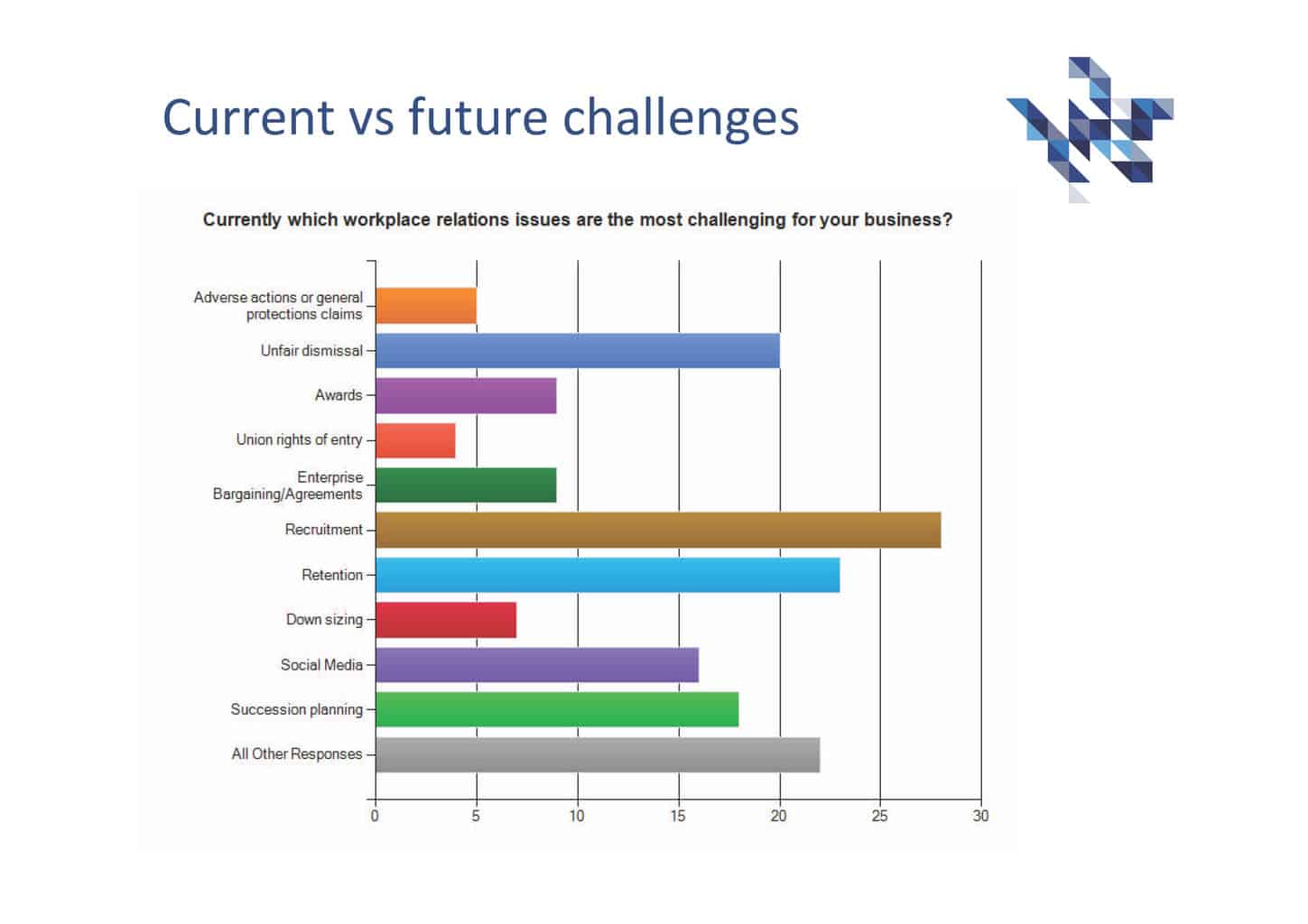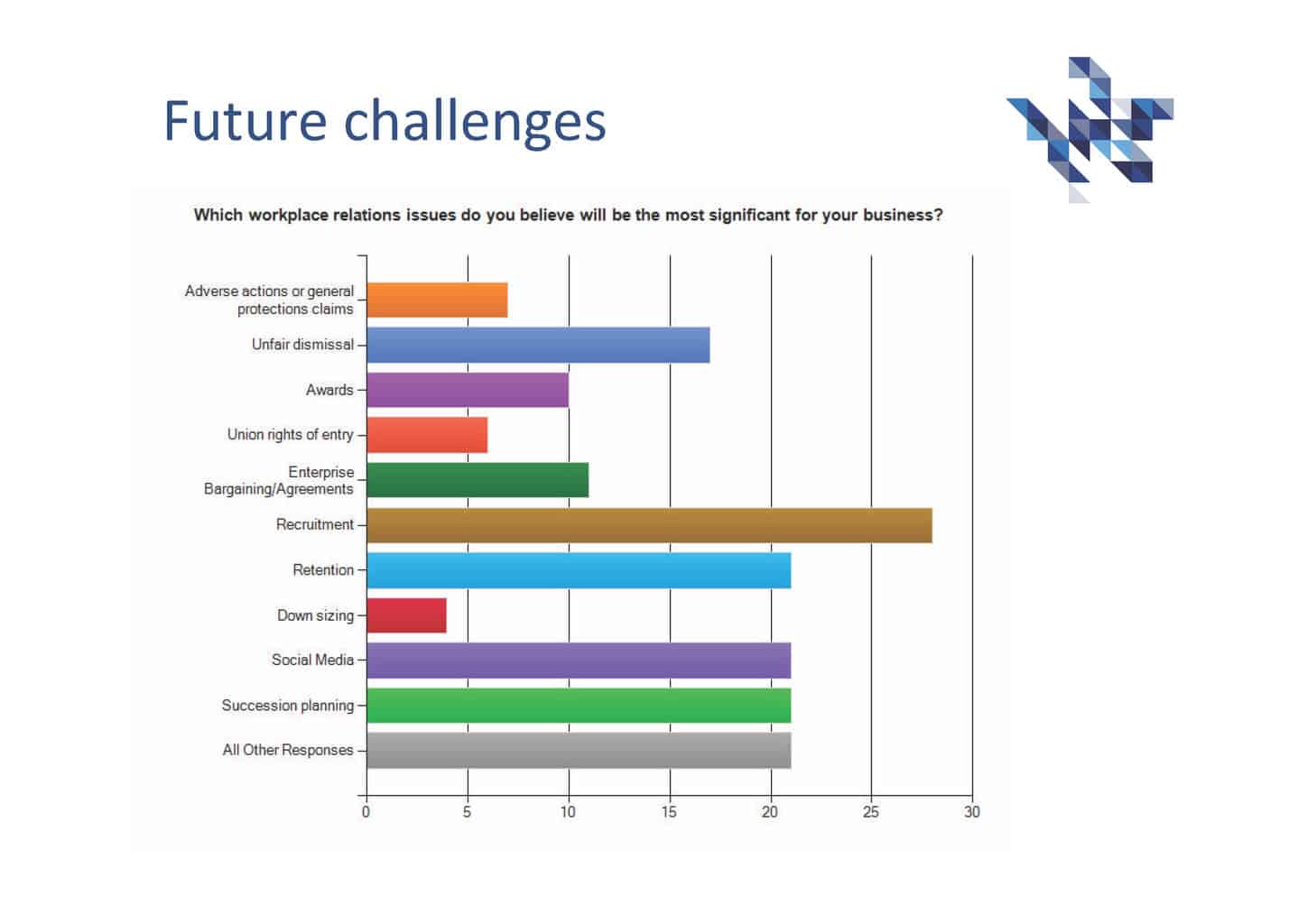Most managers complain about “silos” even though they often operate comfortably in one. Having an organisational structure that operates without narrow parameters of professional turf is very difficult and sustainable change takes time. Similarly many professions operate in silos and the safety profession is a good example. Rarely does it “play well with others”. A recent workplace relations survey report from the Australian law firm, Madgwicks, illustrates the silo of the professions and its impediment to change.
Most law firms that have occupational health and safety professionals sit the unit with the Workplace Relations portfolio, for good reasons mostly. Workplace Relations, or Industrial Relations in other jurisdictions, deals with the pay and conditions of workers and the negotiation of these issues with employers and business owners. “Pay” is mostly wages and the remuneration received for effort but “conditions’ is more inclusive with OHS a major, but often underplayed, component.
Madgwicks asked two significant questions:
“Currently which workplace relations issues are the most challenging for your business?” and
“Which workplace relations issues do you believe will be the most significant for your business?”
None of the responses (pictured below) to these questions included any occupational health and safety issues. There was no stress. Nothing on workloads or working hours. Nothing on workplace bullying.
 A major reason for this disparity will be that, as Madgwicks says, the
A major reason for this disparity will be that, as Madgwicks says, the
“The purpose of the survey was to gauge the sentiment of our clients about the operation of Fair Work Australia.”
This survey is intended to identify issues associated with “conditions” but not with OHS, as OHS operates under separate legislation and separate regulators, but the results do OHS a great disservice by “silo-ing” OHS out of workplace relations. It is not Madgwicks’ fault in the big scheme of things because that big scheme is governmentally controlled and the government controls the regulatory silos.
 As businesses grow, organisational silos develop and grow with them. Somewhere along that growth line, businesses get the impression that issues are managed better through specialisation. This is compounded by many business service providers promoting their speciality. There are very few “jacks of all trades” because business, understandably, only want to deal with the “best”, the specialists, but specialists often provide advice that is so narrow (so “silo-ed”) that it is effectively useless.
As businesses grow, organisational silos develop and grow with them. Somewhere along that growth line, businesses get the impression that issues are managed better through specialisation. This is compounded by many business service providers promoting their speciality. There are very few “jacks of all trades” because business, understandably, only want to deal with the “best”, the specialists, but specialists often provide advice that is so narrow (so “silo-ed”) that it is effectively useless.
Businesses may need “safety jacks”, OHS professionals who have sufficient experience and knowledge to interpret the expert opinions and to suggest ways of applying the expertise to the specific businesses or workplaces. Business need interpreters, but this will only work over the long term if business embraces integration and smashes the silo structures.
This structural demolition will need managers to relinquish their egos, to acknowledge the negative impacts of the empires they have built over the last few decades, and then embrace a new future.
This demolition, similarly, needs applying to the “soft management sciences” in which OHS can be included, and to the professional associations representing those sciences. The following business disciplines must develop a coordinated strategy to assist prospective clients – Human Resources, Occupational Safety, Wellbeing advocates, Industrial Relations, Trade Unions, Mental Health, Occupational Medicine, Industrial Hygienists………
This is certainly the hard way to change but it seems that the best sustainable solutions are rarely the easiest or the ones that occur with the least disruption.
It would be a step in the right direction to include OHS when undertaking workplace relations surveys, even if the response data is not immediately useful. How different, and more interesting, Madgwicks survey would have been if the challenges and issues were not restricted to those administered under Fair Work Australia.

Managers forego their egos? Deconstruct years of empire building? It will never happen. All anyone cares about is covering their arse and not raising an issue. If you question the status quo or even suggest an improvement, you are a “trouble maker” and alienated.
I hear the word “Culture” and how it must be improved all the time, but when you ask someone to change a view or even an approach, the walls go up. Too hard, too costly, too much trouble. The industry has become full of cliche’s and slogans and little else
Experience counts for nought, you must join the crowd or risk being forever dissatisfied with so called safety improvement
John, change is a big ask and this is asked in other areas of business but not often in OHS, except in patches or in short-term spines to the latest hazard or fad.
On the issue of culture, please use the search field on the left of the blog for “culture” and you will get a good understanding of this blog’s thoughts on the issue.
In brief, new cultural values a very difficult to superimpose on an established workplace and organisation. Those companies who have achieved a positive workplace culture have usually “designed” these values into a business from the early stages, which is, admittedly, rare. Other companies have expended enormous amounts of money on cultural re-education, a luxury that is increasingly beyond most companies.
I must also say that “covering one’s arse” is not ALL annoying thinks about but legal and risk exposure has to be one element of any safety strategy. The damage occurs when the management of this risk overrides other considerations or is seen to be THE priority. Rarely is this the case but often it looks that way.
I couldn’t agree more. Your context places OHS as one of the Soft Professions but it depends on the context. OHS professionals often specialise for example in areas of legal interpretation but have absolutely no appreciation of areas where sound understanding of technology is required and partnership with electrical and software engineers is required to implement a rigid safety system. The “safety silo” can then make it harder to assist the actual implementers of safety, the line managers and maintainers, to do their due dilligence effectively.
In this sense, OHS is a technical profession and hence the agreement on “safety jacks” and the ability to communicate at all levels.
Tim, I hesitated in referring to OHS as a “soft profession” but most industries have that perception, that some elements of OHS are essential but others can be chosen when necessary. OHS needs to be consistently applied as an integrated element to how business operates.
There are many reasons why OHS is silo-ed with one being that it often comes late in the business planning. OHS comes into existence once production is planned or even becomes operational. It is rarely considered in the initial business scope and as a safety values are often re-engineered onto an ill-fitting structure.